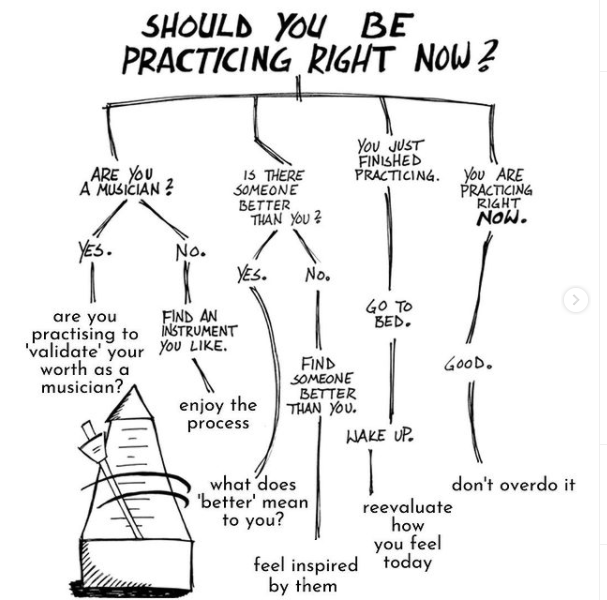Disordered practice is a mental health issue
Rebecca’s amended version of the meme
The original meme
June 30 2021 by Hattie Butterworth
Working with Rebecca recently has seen me dig deeper into my past as a musician. Her diligence in helping musicians recognise their worth purely as people is so important and inspiring. Still, there is a younger version of me I remember, so wrapped up in disordered practice culture that wouldn’t want to see the point in being kind to myself.
The most dangerous factor of a young musician’s existence is the extent to which ‘disordered’ practice has been normalised. This ‘disorder’ witnessed in a practice regime which engenders guilt, fear, comparison and pain in the young person. We are given an (often unrealistic) number to aim towards, encouraged by professors and industry leaders. A sacred hours-per-day, the failure of completing which promising future career disaster and unworthiness as a musician.
In recent times, thinking about practice obsession and disorder links eerily neatly for me to my knowledge and experience of eating disorders. If I list mental symptoms associated with disordered eating, I think it may become more apparent the ways in which they may be linked:
Symptoms of eating disorders include:
-Spending a lot of time worrying about your weight and body shape
-Avoiding socialising when you think food will be involved
-Eating very little food
-Deliberately making yourself sick or taking laxatives after you eat
-Exercising too much
-Having very strict habits or routines around food
-Changes in your mood
If we change this to focus around our practice culture in music schools/colleges:
Symptoms of disordered practice include:
-Spending a lot of time worrying about your playing and worth as a musician
-Avoiding socialising when you think you haven’t practiced enough
-Taking very little time off
-Deliberately making yourself practice at strange hours to relieve the discomfort of not feeling good enough
-Practicing too much
-Having very strict habits or routines around practice
-Changes in your mood
The extent to which these behaviours have been normalised feels baffling when we see these ‘diagnoses’ side by side. Of course it is almost inevitable, and not inherently wrong, that creative people go through a level of structure, focus and comparison in order to improve and reach a high standard, but this structure has been abused.
We are at a potentially dangerous place within our profession. By controlling the way that young people think about practice and technical ability, we are leading them to believe that disordered practice methods are entirely synonymous with being a worthy musician.
My wish is that talented musician emerging from institutions be shown that their worth and musicianship lies as much within the freedom to experience a full life as it does within the practice room.
Hattie xx
Disordered eating symptoms source:



